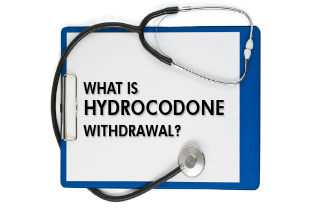Are you planning to go through hydrocodone withdrawal?
Maybe you are dependent on hydrocodone physically. Perhaps you are treating hydrocodone addiction, or psychological dependence on hydrocodone. In fact, hydrocodone dependence vs addiction manifest differently. Regardless, there is only one way to withdraw from hydrocodone.
Here, we review what happens in the body when you withdraw from hydrocodone and why. What are symptoms of hydrocodone withdrawal and how long do they last? Plus, how hydrocodone withdrawal feels and what can help ease symptoms. We then invite your questions about withdrawing from hydrocodone at the end.
What is hydrocodone withdrawal syndrome?
Hydrocodone is semi synthetic narcotic analgesic and antitussive (anti-cough medicine) which is prescribed for severe pain. Hydrocodone is a generic version of Vicodin (without acetaminophen), making it a bit softer on the body system. But how does hydrocodone work? And why does the body go through withdrawal?
Hydrocodone works by suppressing or blocking pain receptors in the brain, which slows the body’s response to pain. But as you take hydrocodone daily, your body starts to become used to the opioid. Over time, the brain and central nervous system adapt to the presence of hydrocodone and adapt their own chemistry to accommodate hydrocodone and keep the body running normally. When this happens, you are physically dependent on hydrocodone.
When you are dependent on hydrocodone and you stop taking hydrocodone, a period of withdrawal will occur. Symptoms of withdrawal manifest because the brain is still trying to compensate for the opiates effects on the central nervous system and smooth muscle. Because hydrocodone decreases activity and responses in the body, once you stop taking hydrocodone your body tries to establish normalcy. But it takes time to balance out the chemicals in your brain again. To establish normalcy, your body switches from the hydrocodone adapated environment to a sudden pendulum effect resulting in unpleasant withdrawal symptoms. Withdrawal feels uncomfortable as symptoms such as, chills, drowsiness, and mood changes arise.
What is withdrawal from hydrocodone like?
Hydrocodone withdrawal is like a really, really bad flu with symptoms such as ever, body aches, chills, and fatigue. But make no mistake: the sudden experience of hydrocodone withdrawal symptoms is unpleasant. And for a time, hydrocodone withdrawal might be just as painful as the initial reason you starting taking hydrocodone. Withdrawal from hydrocodone can also wear on you emotionally making withdrawal a trying process. Withdrawal from hydrocodone includes symptoms such as:
- confusion
- depression
- diarrhea
- mood swings
More severe symptoms of hydrocodone withdrawal may include:
- extreme drowsiness
- seizures
- sleep disturbance
- stomach pain
- strong drug craving
What does hydrocodone withdrawal feel like?
During hydrocodone withdrawal, you will no longer feel relaxed and without pain. Instead, withdrawal is much the opposite. Aches and chills can tire you out and you may require more sleep. You may also suffer tremors which could make daily activity difficult. Onset of withdrawal symptoms will manifest between 8-12 hours after your last dose. After about 2 to 3 days, people have reported having intense drug cravings. But most of the flu like symptoms will regulate after several days. You will begin to feel normal again after a week or so. However, once the physical dependence has waned you may still experience psychological need and cravings for hydrocodone.
What helps hydrocodone withdrawal?
The most important treatment protocol to follow during hydrocodone withdrawal is to taper the pain medication before complete cessation. Additionally, prescription, over-the-counter medications and home remedies can help manage hydrocodone withdrawal symptoms. However, it is always best to be supervised by a physician for help for hydrocodone withdrawal. Furthermore, while hydrocodone is a medication you can stop cold turkey, some cases are best served in clinical detox.
1. Tapering hydrocodone doses
It is possible to stop taking hydrocodone suddenly. But you may be in a world of pain and discomfort if you just stop taking hydrocodone cold turkey. Instead, tapering is a process that can decreases the intensity and severity of withdrawal symptoms. During hydrocodone tapering, your physician will reduce your dose of hydrocodone over the course of a several weeks to the smallest possible amount until you are no longer physically dependent on the medication. Tapering can take days, weeks, even months before your body no longer has traces of the medication. Most opioids are reduced in 10% increments, allowing for dosing adjustments as needed.
2. Prescription medications for hydrocodone withdrawal
Doctors may recommend different medications to address hydrocodone withdrawal symptoms and to support dextox. Medications that have been used for severe hydrocodone withdrawal symptoms have included short acting anti-depressants, buprenorphine, clonidine, or Immodium. Mostly, over the counter NSAID medications like Ibuprofen and Tylenol can help with the aches or pains. Also flu medications might be helpful treating flu-like symptoms. It is important to be careful with medications while you are withdrawal and to use them carefully. Know your body and what it needs.
3. Home remedies for hydrocodone withdrawal
Home remedies are a helpful way to support hydrocodone withdrawal on your own terms. It is important that you are proactively taking care of withdrawal symptoms. In general, people have said the following are helpful remedies for hydrocodone withdrawal:
- bland diet
- heating pads
- increase fluid and electrolytes
- keeping busy
- peppermint/ginger teas for nausea and stomach issues
- seeking help if needed
- talk to someone
- warm showers
- warm showers or baths
Questions about hydrocodone withdrawal?
Please ask your hydrocodone questions below. We are happy to respond to you personally, and will try to answer your questions ASAP. And if we don’t know the answer, we will refer you to someone who does.









Related Posts